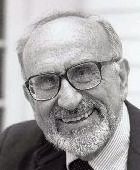Rationale for Inclusion
- Architect of Airline Deregulation: Alfred E. Kahn is best known as the “father of airline deregulation” in the United States. As the chair of the Civil Aeronautics Board (CAB) in the late 1970s, Kahn played a pivotal role in dismantling the federal regulations that governed the airline industry for decades. His work culminated in the passage of the Airline Deregulation Act of 1978, which eliminated government control over fares, routes, and market entry for airlines. This historic piece of legislation fundamentally reshaped the aviation industry and had a lasting impact on air travel in the U.S. and beyond.
- Transformation of the U.S. Airline Industry: Kahn’s efforts at deregulation transformed the U.S. airline industry from a highly regulated, government-controlled system into a dynamic, competitive market. Airlines gained the freedom to set their own fares, determine their own routes, and compete on service, price, and innovation.
- Increased Affordability and Accessibility of Air Travel: One of the most significant outcomes of Kahn’s work on airline deregulation was the dramatic reduction in airfares, which made air travel more accessible to the general public. Prior to deregulation, air travel was largely seen as a luxury for wealthier individuals, but the increased competition among airlines led to a sharp decline in ticket prices. This democratization of air travel allowed millions of Americans to fly for the first time and helped grow the aviation industry by making air travel a more common mode of transportation.
- Influence on Global Aviation Policy: Alfred Kahn’s work on airline deregulation had a ripple effect around the world, influencing global aviation policy. Many countries followed the U.S. example and began to deregulate their own airline industries in the 1980s and 1990s, leading to a more competitive global aviation market. His success in transforming the U.S. aviation sector demonstrated the benefits of market-based competition and inspired similar reforms internationally.
- Enduring Legacy in Aviation Economics: Alfred Kahn’s legacy in aviation extends far beyond his role in deregulation. He is remembered as one of the most influential economists in the field of transportation economics, particularly for his contributions to understanding the effects of regulation and deregulation on industries. His work has become a cornerstone of aviation policy and economic theory, and his advocacy for competition continues to shape the way policymakers approach regulation in the airline industry and beyond.

Biography
- Early Life and Education: Alfred Edward Kahn was born on October 17, 1917, in Paterson, New Jersey. He grew up in a modest household and showed early promise as an academic, with a keen interest in economics. Kahn attended New York University, where he earned a bachelor’s degree in 1936, and later earned a Ph.D. in economics from Yale University in 1942.
- Personal Life: Kahn was married to Hannah Schain in 1943, and they had two children. Known for his sharp intellect and sense of humor, Kahn balanced his professional life with a dedication to his family. He was deeply committed to his role as an educator and often spoke about the importance of fair and effective public policy.
- Early Career: Alfred Kahn’s early career was largely academic, as he became a professor of economics at Cornell University. He gained recognition for his expertise in regulatory economics and was a vocal critic of inefficient and outdated regulatory systems. In 1977, Kahn was appointed by President Jimmy Carter to chair the Civil Aeronautics Board (CAB), a role that would define his legacy. At the CAB, Kahn was the chief architect of the Airline Deregulation Act of 1978, which dismantled federal control over fares, routes, and market entry for airlines.
- In recognition of his service to aviation Kahn received numerous awards and accolades, including:
- Receipt of the L. Welch Pogue Award for Lifetime Achievement in Aviation (1997)
